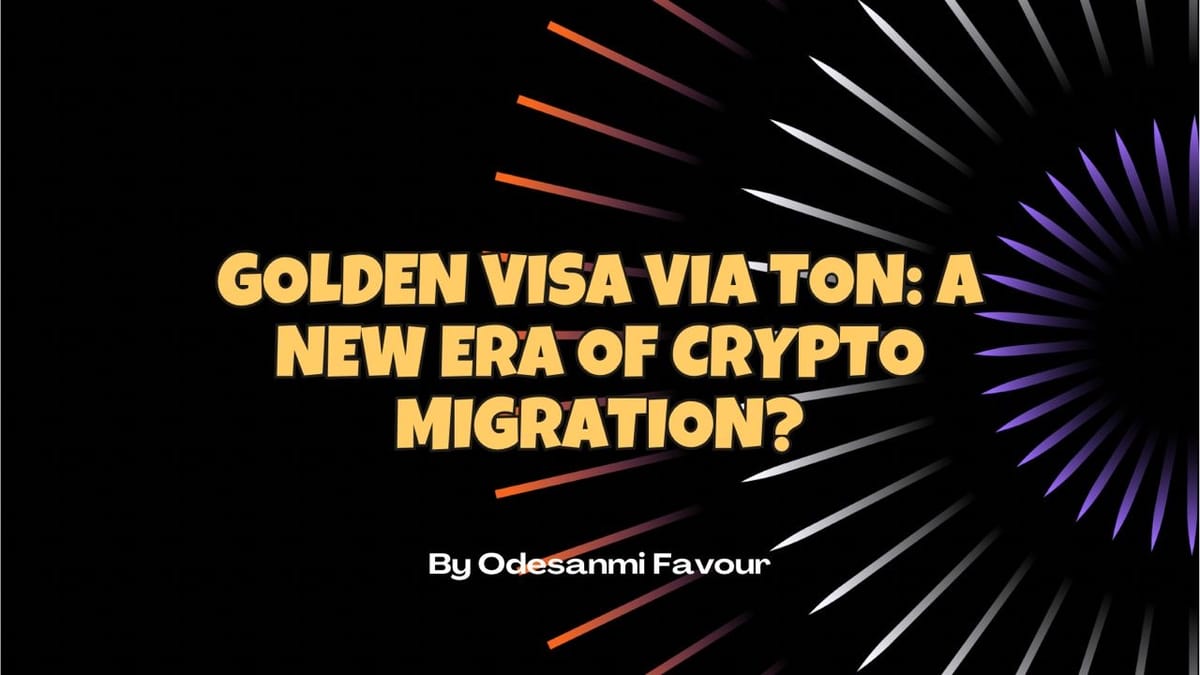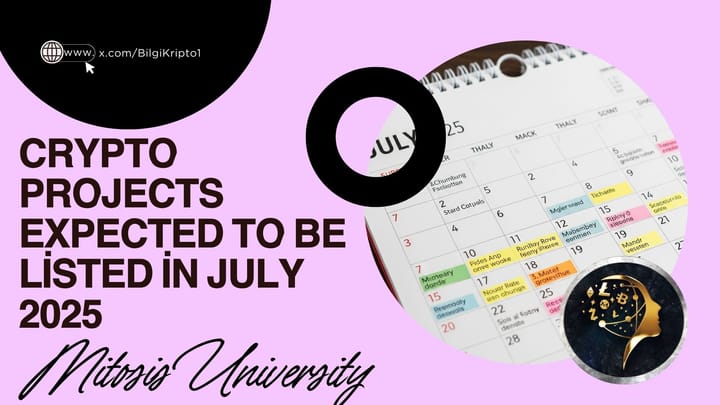Golden Visa via TON: A New Era of Crypto Migration?

Introduction
The intersection of cryptocurrency and global mobility is opening new frontiers, with The Open Network (TON) at the forefront of this transformation. TON’s recently announced initiative to offer UAE Golden Visas through staking $100,000 in Toncoin (TON) has sparked both excitement and skepticism, raising questions about the viability of crypto-based residency programs. While UAE authorities have denied official endorsement of TON’s program, the concept signals a potential shift toward integrating blockchain technology with investment migration. This article explores whether TON’s Golden Visa initiative could herald a new era of crypto migration, examining its mechanics, implications, and broader potential.
In this article, we would explore:
1. Understanding TON’s Golden Visa Program and Its Mechanics
2. Implications for Crypto Adoption and Global Mobility
3. Challenges and Future Prospects of Crypto-Based Residency Programs
Understanding TON’s Golden Visa Program and Its Mechanics
The Open Network (TON), originally incubated by Telegram, has proposed a groundbreaking pathway to UAE residency through its Golden Visa program. Unlike traditional UAE Golden Visa routes, which require substantial investments in real estate or fixed deposits (typically $540,000 or more), TON’s program lowers the financial barrier to $100,000 in staked Toncoin for three years, plus a $35,000 processing fee. This initiative aims to streamline the residency process while leveraging blockchain technology for transparency and user control.
Program Mechanics
The TON Golden Visa program operates through a decentralized smart contract on the TON blockchain, ensuring that staked assets remain under the user’s control during the lock-up period. Applicants undergo a merit-based selection process, bypassing traditional requirements like real estate purchases or minimum income thresholds. The process, from document submission to visa approval, is touted to take under seven weeks—significantly faster than the three-to-six-month timeline of conventional routes. Additionally, the program offers an estimated 3–4% annual yield on staked TON, providing a financial incentive, and extends visa coverage to spouses, children, and parents at no extra cost beyond standard government fees.
For Example: A Crypto Investor’s Journey
Consider a crypto investor, Alice, who holds $100,000 in Toncoin. She applies for the TON Golden Visa by submitting documents online and staking her TON through a non-custodial smart contract. Over three years, Alice retains control of her assets, earns a modest yield, and secures a 10-year UAE residency for herself and her family. Compared to purchasing a $540,000 property, Alice’s investment is more liquid, and the process is faster, aligning with her digital-first financial strategy. However, the program’s lack of official UAE endorsement introduces uncertainty, as Alice must rely on third-party partners for visa processing.
Why It Matters
TON’s program reflects a shift toward integrating decentralized finance (DeFi) principles into real-world applications like migration. By using blockchain for transparency and smart contracts for asset control, TON aims to appeal to crypto-native investors seeking global mobility. However, the UAE’s denial of the program’s official status highlights regulatory hurdles, as digital currency investments are not currently recognized for Golden Visa eligibility.
Implications for Crypto Adoption and Global Mobility
The concept of a crypto-based Golden Visa has profound implications for both cryptocurrency adoption and global mobility. By linking token staking to residency, TON’s initiative could bridge the gap between digital assets and tangible real-world benefits, potentially reshaping how wealth and mobility are managed in the digital age.
Boosting Crypto Adoption
The promise of a Golden Visa through TON staking creates a compelling use case for Toncoin, driving demand and reducing circulating supply by locking tokens for three years. Following the announcement, Toncoin’s price surged 10–13%, reaching $3.08, with trading volume spiking 607% to $643 million in 24 hours. This market reaction underscores the crypto community’s enthusiasm for real-world utility, as seen in posts on X praising the program as a “game-changer” for crypto adoption. By tying token ownership to a desirable outcome like UAE residency, TON incentivizes long-term holding, potentially stabilizing its token economics.
Enhancing Global Mobility
The UAE is a global hub for crypto and blockchain innovation, ranking third on the Henley Crypto Adoption Index for 2024. Its business-friendly policies, tax incentives, and progressive regulations—like the retroactive exemption of crypto transactions from 5% VAT since 2018—make it a prime destination for digital nomads and investors. TON’s program, if validated, could lower the entry barrier for residency, making it accessible to a broader range of crypto holders compared to traditional routes requiring illiquid investments. This aligns with global trends, as countries like Portugal and El Salvador offer crypto-friendly residency pathways, such as Portugal’s Golden Residence Permit, which accepts $500,000 in crypto investments.
For Example: Comparison with Traditional Routes
A traditional UAE Golden Visa requires a $540,000 real estate investment, which is illiquid and subject to market risks. In contrast, TON’s program requires $100,000 in staked TON, which remains liquid and earns yield, with a faster approval timeline. For instance, a family seeking residency could save over $400,000 and avoid real estate market volatility, while benefiting from the UAE’s Esaad Privilege Card, offering discounts on luxury services and global travel perks. This cost-efficiency and flexibility could attract high-net-worth crypto investors, fostering a new class of “digital nomads” with global mobility.
Broader Impact
If successful, TON’s model could inspire other blockchains and nations to adopt crypto-based residency programs. Posts on X suggest potential for similar initiatives in Portugal and Saint Kitts & Nevis, using NFT-based proof of ownership. This could normalize crypto as a legitimate asset class for investment migration, aligning with the UAE’s vision to attract crypto talent and capital.
Challenges and Future Prospects of Crypto-Based Residency Programs
While TON’s Golden Visa program is ambitious, it faces significant challenges, as evidenced by the UAE’s swift denial of official backing. These hurdles highlight the tension between crypto innovation and regulatory frameworks, but they also point to a future where such programs could thrive with proper alignment.
Regulatory Challenges
The UAE’s Federal Authority for Identity, Citizenship, Customs and Port Security (ICP), Securities and Commodities Authority (SCA), and Virtual Assets Regulatory Authority (VARA) have clarified that digital currency investments do not qualify for Golden Visas, which are limited to categories like real estate investors and exceptional talents. TON’s program, managed by third-party partners rather than government entities, lacks regulatory approval, and TON is not licensed by VARA. Legal experts, like Irina Heaver, emphasize that crypto initiatives in the UAE require rigorous compliance with federal and local laws, including KYC and AML policies. The premature announcement, amplified by Telegram CEO Pavel Durov’s retweet, led to a 6% price drop in Toncoin after the UAE’s rebuttal, underscoring the risks of unverified claims.
For Example: The TON Misstep
TON’s announcement, shared by crypto influencer Ash Crypto and retweeted by Durov, created significant hype, with Toncoin briefly hitting $3.05. However, the UAE’s denial and Durov’s subsequent deletion of the retweet damaged credibility. Changpeng Zhao (CZ), former Binance CEO, questioned the program’s legitimacy, noting the lack of official government confirmation and the high $35,000 processing fee compared to typical agent fees of $1,000. This incident illustrates the dangers of aggressive marketing without regulatory vetting, as noted by legal experts who advocate for quick legal reviews to avoid fines and reputational damage.
Future Prospects
Despite the setback, TON’s initiative highlights the potential for crypto-based residency programs. The TON Foundation has clarified that the program is in early development with a licensed partner, suggesting a path toward regulatory compliance. Other countries, like El Salvador with its $1 million Bitcoin “Freedom Visa” and Hong Kong’s recognition of crypto for investment immigration, demonstrate growing acceptance of digital assets in migration frameworks. The UAE’s crypto-friendly policies, including tokenized real estate and a Machine Economy Free Zone, indicate openness to innovation, provided it aligns with regulations.
To succeed, future programs must:
- Secure Regulatory Approval: Collaborate with authorities like VARA to ensure compliance.
- Enhance Transparency: Use blockchain’s verifiable nature to build trust, as TON’s smart contracts aim to do.
- Leverage Partnerships: Work with licensed migration agencies, like Peravel, which claims a 95% approval rate for international programs.
For Example: A Path Forward
Imagine TON revising its program to align with UAE regulations, partnering with a VARA-licensed entity to process applications. By integrating NFT-based proof of ownership, as suggested in X p osts, TON could streamline verification while ensuring compliance. This could attract 10,000 applicants in the first year, locking $1 billion in TON and boosting its ecosystem, while offering a scalable model for other blockchains like BNB, as CZ hinted.
Conclusion
TON’s Golden Visa program, though currently unofficial, represents a bold step toward a new era of crypto migration. By lowering financial barriers and leveraging blockchain for transparency, it could redefine how crypto holders access global residency. However, regulatory challenges and the need for official endorsement highlight the importance of aligning innovation with legal frameworks. As the UAE and other nations embrace crypto-friendly policies, TON’s initiative could pave the way for a future where digital assets unlock real-world opportunities, creating a seamless bridge between DeFi and global mobility.



Comments ()